Kathleen Jones's Blog, page 52
July 27, 2013
Katherine Mansfield and her brother in France
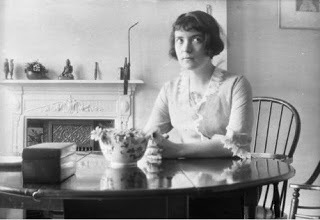 Today a wonderful post by Mel U at '
The Reading Life
' about Katherine Mansfield in Paris and her brother Leslie, who died during the first world war. He has lovely photos of their gravestones and a poem that Katherine wrote to her brother.
Today a wonderful post by Mel U at '
The Reading Life
' about Katherine Mansfield in Paris and her brother Leslie, who died during the first world war. He has lovely photos of their gravestones and a poem that Katherine wrote to her brother.Read Katherine Mansfield in Paris here......
Published on July 27, 2013 04:15
July 22, 2013
Tuesday Poem: Briggflatts - Basil Bunting on Poetry
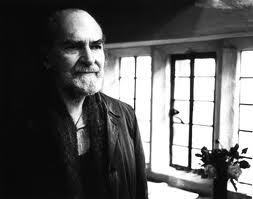 Basil Bunting: Bloodaxe BooksI've been reading
Basil Bunting'
s long, autobiographical poem,
Briggflatts,
(pub. 1966) because of its influence on the work of Norman Nicholson. But I've also been enjoying the rediscovery of a wonderful piece of literature, set partly in my own homeland - Cumbria - where Bunting spent time when he was young. Brigflatts (spelled with one g) is a place, one of the earliest Quaker meeting houses in Britain, on the south-eastern edges of the county, near Sedbergh. A familiar landscape for me because it's not far from my home in Appleby. But on re-reading, I've also discovered that Basil Bunting spent time with Ezra Pound in the same Italian mountains I'm currently living in. This, too, is a place for poetry -
Basil Bunting: Bloodaxe BooksI've been reading
Basil Bunting'
s long, autobiographical poem,
Briggflatts,
(pub. 1966) because of its influence on the work of Norman Nicholson. But I've also been enjoying the rediscovery of a wonderful piece of literature, set partly in my own homeland - Cumbria - where Bunting spent time when he was young. Brigflatts (spelled with one g) is a place, one of the earliest Quaker meeting houses in Britain, on the south-eastern edges of the county, near Sedbergh. A familiar landscape for me because it's not far from my home in Appleby. But on re-reading, I've also discovered that Basil Bunting spent time with Ezra Pound in the same Italian mountains I'm currently living in. This, too, is a place for poetry - It tastes good, garlic and salt in it,
with the half-sweet white wine of Orvieto
on scanty grass under great trees
where the ramparts cuddle Lucca.
It sounds right, spoken on the ridge
between marine olives and hillside
blue figs, under the breeze fresh
with pollen of Apennine sage ....
And he describes the mountains behind us and the workings of the marble industry that Neil and I are now so familiar with.
White marble stained like a urinal
cleft in Apuan alps,
always trickling, apt to the saw. Ice and wedge
split it or well-measured cordite shots,
while paraffin pistons rap, saws rip
and clamour is clad in stillness;
clouds echo marble middens, sugar-white,
that cumber the road stones travel
to list the names of the dead.
There is a lot of Italy in churchyards,
sea on the left, the Garfagnana
over the wall, la Cisa flaking
to hillside fiddlers above Parma . . .
The edition of Briggflatts I'm using contains a free cd of Bunting reading the poem as well as a dvd of a documentary on his life. It also has a biographical essay and several pieces that Bunting himself wrote on poetry, which I found really illuminating.
'Poetry,' Bunting says, 'like music, is to be heard. It deals in sound - long sounds and short sounds, heavy beats and light beats, the tone relations of vowels, the relations of consonants to one another which are like instrumental colour in music. Poetry lies dead on the page, until some voice brings it to life ... Reading in silence is the source of half the misconceptions that have caused the public to distrust poetry. . . I believe the fundamental thing in poetry is the sound, so that, whatever the meaning may be, if you haven't got the sound right, it isn't a poem.'
On Briggflatts he writes: 'I have set down words as a musician pricks his score, not to be read in silence, but to trace in the air a pattern of sound that may sometimes, I hope, be pleasing'. He sometimes drew diagrams of a poem - its shape and pattern - even before he knew what was going to be in it.
 Bunting's diagram of Briggflatts
Bunting's diagram of BriggflattsHis poetry is rich in 'word music' - the rhythms of Northumberland dialect and the Norse vocabulary the Vikings left behind them. It's not easy poetry, but the poet is right - if you read it aloud it makes its own meaning.
Basil Bunting is buried in the graveyard behind the Quaker meeting house at Brigflatts. If you'd like to hear him reading extracts from the poem, please click here for the YouTube film .
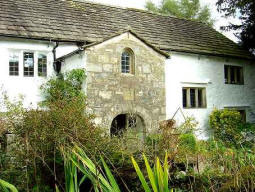
If you'd like to see what the other Tuesday Poets are posting, please head on over to the Tuesday Poem blog at http://tuesdaypoem.blogspot.com
Published on July 22, 2013 09:30
July 18, 2013
Wild England - After London, reading Richard Jefferies
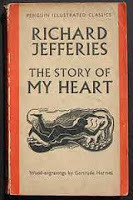
The Story of my Heart , by nineteenth century author Richard Jefferies , is one of my most precious books, consumed first when I was a romantic girl and re-read several times since. Nothing and no-one else has ever been able to convey for me the ecstasy of being part of the natural world, that sense of being one with the universe, the way that Jefferies did in that book. It's almost pagan in its sentiments. But, oddly, although I've loved his nature writing, I've never read any of the fiction that Jefferies wrote.
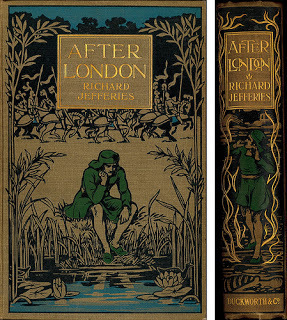 I came across '
After London, or Wild England
' through reading Philip Hoare, and now I can't believe I've not found it before. It's a dystopian view of the world, written in 1885, before dystopia was fashionable. Society has collapsed and the population of England has mysteriously vanished. Civilisation, as we know it, is now pre-history. The big cities have crumbled into ruin, overgrown by bramble and saplings, and London has disappeared under a vast inland lake. Previously domestic species have discovered their original instincts, alongside zoo animals and migrating animals. The few remaining human beings have also gone feral. England has gone wild.
I came across '
After London, or Wild England
' through reading Philip Hoare, and now I can't believe I've not found it before. It's a dystopian view of the world, written in 1885, before dystopia was fashionable. Society has collapsed and the population of England has mysteriously vanished. Civilisation, as we know it, is now pre-history. The big cities have crumbled into ruin, overgrown by bramble and saplings, and London has disappeared under a vast inland lake. Previously domestic species have discovered their original instincts, alongside zoo animals and migrating animals. The few remaining human beings have also gone feral. England has gone wild.'Footpaths were concealed by the second year, but roads could be traced, though as green as the sward, and were still the best for walking, because the tangled what and weeds, and, in the meadows, the long grass, caught the feet of those who tried to pass through. Year by year the original crops of wheat, barley, oats and beans asserted their presence by shooting up, but in gradually diminished force, as nettles and coarser plants such as the wild parsnips, spread out into the fields from the ditches and choked them.
Aquatic grasses from the furrows and water-carriers extended into the meadows, and, with the rushes, helped to destroy or take the place of the former sweet herbage. . . . Sapling ashes, oaks, sycamore, and horse-chestnuts, lifted their heads. Of old time the cattle would have eaten off the seed leaves with the grass so soon as they were out of the ground, but now most of them took root and grew into trees. By this time the brambles and briars had choked up and blocked the former roads, which were as impassable as the fields.
No fields, indeed, remained, for where the ground was dry, the thorns, briars, brambles and saplings filled the space and these thickets and the young trees had converted most part of the country into an immense forest. Where the ground was naturally moist, and the drains had become choked with willow roots, sedges and flags and rushes covered it. Thorn bushes were there, too, but not so tall; they were hung with lichen. Besides the flags and reeds, vast quantities of the tallest cow-parsnips rose five or six feet high and the willow herb with its stout stem, almost as woody as a shrub, filled every approach.
By the thirtieth year there was not one single open place, the hills only excepted, where a man could walk, unless he follow the tracks of wild creatures or cut himself a path.....'
 After London
is a fictional history of the cataclysm and its aftermath, written by some future scribe. It's the long, novella length, prelude to a novel, which features some of the human beings now living in the new age of barbaric survival. This makes it a broken-backed kind of book and I didn't enjoy the novel in the same way that I enjoyed the first one. It's such a beautiful vision of England gone wild - a possible pre-vision of what the future might look like. Because it's out of copyright it can be
downloaded from the internet free
from the Gutenberg project.
After London
is a fictional history of the cataclysm and its aftermath, written by some future scribe. It's the long, novella length, prelude to a novel, which features some of the human beings now living in the new age of barbaric survival. This makes it a broken-backed kind of book and I didn't enjoy the novel in the same way that I enjoyed the first one. It's such a beautiful vision of England gone wild - a possible pre-vision of what the future might look like. Because it's out of copyright it can be
downloaded from the internet free
from the Gutenberg project.
Published on July 18, 2013 07:20
July 16, 2013
Wild Larkspur in the Olive Grove
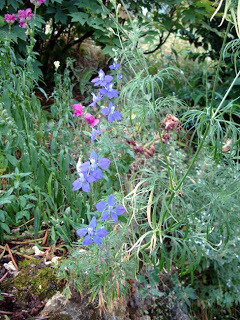
I've not had time to put up a Tuesday Poem, but this beautiful wild flower is a poem in itself. Normally the olive grove would be burnt to a crisp by now, but the amount of rain we've had and the very late summer mean that there's a lot of plants still in flower and everything is relatively green. I found this vivid blue larkspur growing out of a wall in the olive grove. It's tiny and the most exquisite blue colour. Who needs garden centres when nature can do it for you?
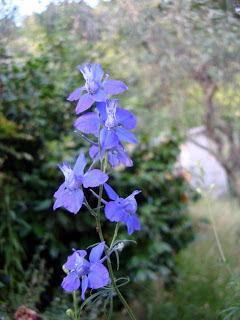
If anyone would like to check out what the Tuesday Poets are doing and read this week's Tuesday Poems, please click on this link.
Published on July 16, 2013 13:03
July 14, 2013
Visiting Heathcliff
I've just been to England for a quick research trip on Norman Nicholson, and went to see my grand-daughters in a musical production of
Footloose.
It was wonderful to see so many exuberant young people giving up all their free time to sing and dance and produce a show to professional standards.
The Musical Youth Theatre
is a fantastic organisation and takes children between 8 and 18. There's such a lot of talent around!
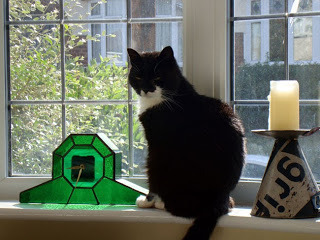
And I also got to visit my beloved cat, Heathcliff. He was fostered by a neighbour when I began spending so much time in Italy, but last year the neighbour moved and I had to find him a more permanent home. Lots of tears shed! But then my daughter offered to take him and the children were very keen, so Heathcliff became a city-dweller. He's settled well, despite his age (he's coming up to 14), and tolerates no trespassers in the garden! He also seems quite healthy, though he has a cataract in one eye now. Lovely to spend time with them all, and the weather was hot enough to sit out in the garden until midnight.

And I also got to visit my beloved cat, Heathcliff. He was fostered by a neighbour when I began spending so much time in Italy, but last year the neighbour moved and I had to find him a more permanent home. Lots of tears shed! But then my daughter offered to take him and the children were very keen, so Heathcliff became a city-dweller. He's settled well, despite his age (he's coming up to 14), and tolerates no trespassers in the garden! He also seems quite healthy, though he has a cataract in one eye now. Lovely to spend time with them all, and the weather was hot enough to sit out in the garden until midnight.
Published on July 14, 2013 04:38
July 9, 2013
Tuesday Poem: Hay Fever
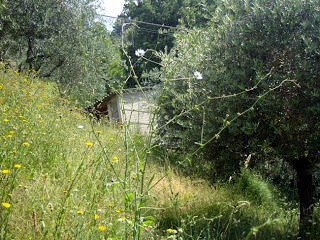
This post is dedicated to all summer sufferers! It's particularly bad in Italy at the moment, with the olive groves waist high in grass and wild flowers and the sweet chestnut trees still shedding pollen. Mustn't complain though - typing and crying at the same time @#*&~
A curse is on the summer;
fever in the flowering grass;
feathered Acacias white
with pollen.
The breeze blows red-eyed
and the sun brews a tisane
of tissues. Pity
to wish for rain.
But I'm off to England tomorrow - so better be careful what one wishes for!
To see what the other Tuesday Poets are posting, please click here for the Tuesday Poem Hub. 'The Night I pierced my own belly button' , by Maria McMillan.
Published on July 09, 2013 05:00
July 7, 2013
Fabrizio de Andre - the Italian Bob Dylan
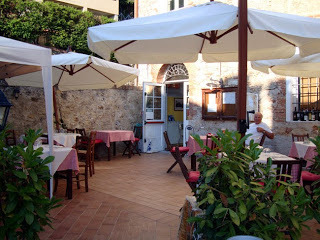 Our little village has an osteria - il Nespolo - locally owned with lovely food and wine at a very cheap price. It often has special events to celebrate local festivals with a fixed price menu and occasionally live music. Last week I noticed an advert for an evening of poetry and music with a meal, all for 15 euros - it seemed an unmissable way to spend a summer evening and do a bit of de-stressing!
Our little village has an osteria - il Nespolo - locally owned with lovely food and wine at a very cheap price. It often has special events to celebrate local festivals with a fixed price menu and occasionally live music. Last week I noticed an advert for an evening of poetry and music with a meal, all for 15 euros - it seemed an unmissable way to spend a summer evening and do a bit of de-stressing!  Fabrizio was quite beautifulI hadn't heard of
Fabrizio de Andre
, but I learned very quickly that he's huge in Italy, even though he died a few years ago. He was born in Genoa, to a rich family, but spent his life supporting libertarianism and pacifism and championing the causes of gypsies and other marginalised people, as well as opposing the Catholic church. Ironic then that he was captured by bandits and held hostage on Sardinia for several months until his family paid the ransom.
Fabrizio was quite beautifulI hadn't heard of
Fabrizio de Andre
, but I learned very quickly that he's huge in Italy, even though he died a few years ago. He was born in Genoa, to a rich family, but spent his life supporting libertarianism and pacifism and championing the causes of gypsies and other marginalised people, as well as opposing the Catholic church. Ironic then that he was captured by bandits and held hostage on Sardinia for several months until his family paid the ransom. 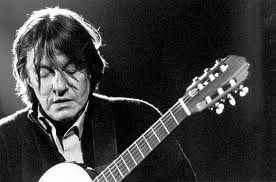
Some of the music was familiar - he translated Leonard Cohen and Bob Dylan into Italian, but he also wrote a great deal of his own. One of the albums that interested me was his response to Edgar Lee Masters 'Spoon River Anthology' - a wonderful volume of poetry where Lee Masters gave voices to all the dead inhabitants of Spoon River and let them tell their life stories one after the other. Fabrizio de Andre, seems to have been heavily influenced by modern poetry and is also regarded as a poet in Italy.
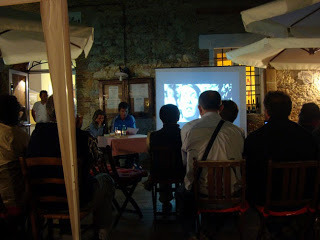
We had a ringside seat from our little table at the back. Alongside the video images and the music, two people took turns to read his lyrics.
It was difficult to find a photograph of him that didn't have a cigarette somewhere attached to his anatomy. Not surprisingly he died of lung cancer at the early age of 59 - he is much mourned here.
You can listen to some of Fabrizio's music on YouTube following this link.
We had a fascinating evening and discovered another aspect of Italy.
Published on July 07, 2013 06:54
July 5, 2013
Confessions of a Word-aholic
A Writer's Life is not all swanning around in the Piazza and drinking wine on the terrace ......
I'm blogging over at Author's Electric today about the downside of being an Indie author - self-inflicted, of course!
A few weeks after I had my second child, short on sleep and high on anxiety, I woke up one morning and when I opened my mouth to speak, found that only gibberish came out. The link, between what I was saying in my brain and what came out of my mouth, was broken. I was utterly terrified. Exhaustion - the doctor said - what you need is sleep. So, a couple of pills were swallowed, baby, feeding bottles, and toddler were handed over to a panicky 'What do I do now?' father, and then I slept for 14 hours straight, woke for a drink and then slept again. The following morning, my voice was back in its normal place, the tongue articulating what the brain dictated. But I've never forgotten what it was like not to be able to communicate.
Since then, I've been a compulsive communicator. And compulsive is the word. In fact, there's a label for it and I think it ends in 'aholic', and has nothing to do with the amount of wine I drink (though, on the other hand . . . .)
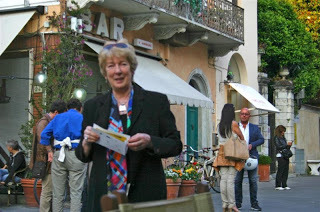 Kathleen, swanning around in the Piazza
Kathleen, swanning around in the Piazza
If you'd like to read more, please click this link.
I'm blogging over at Author's Electric today about the downside of being an Indie author - self-inflicted, of course!
A few weeks after I had my second child, short on sleep and high on anxiety, I woke up one morning and when I opened my mouth to speak, found that only gibberish came out. The link, between what I was saying in my brain and what came out of my mouth, was broken. I was utterly terrified. Exhaustion - the doctor said - what you need is sleep. So, a couple of pills were swallowed, baby, feeding bottles, and toddler were handed over to a panicky 'What do I do now?' father, and then I slept for 14 hours straight, woke for a drink and then slept again. The following morning, my voice was back in its normal place, the tongue articulating what the brain dictated. But I've never forgotten what it was like not to be able to communicate.
Since then, I've been a compulsive communicator. And compulsive is the word. In fact, there's a label for it and I think it ends in 'aholic', and has nothing to do with the amount of wine I drink (though, on the other hand . . . .)
 Kathleen, swanning around in the Piazza
Kathleen, swanning around in the PiazzaIf you'd like to read more, please click this link.
Published on July 05, 2013 00:46
July 1, 2013
Tuesday Poem: Escape to the Southern Ocean by Mary Cresswell
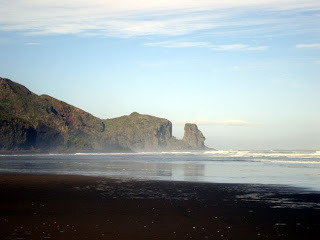 Escape to the Southern OceanCopyright Mary Cresswell
Escape to the Southern OceanCopyright Mary Cresswell Here I will stay, she said; be done with the black north,The sailors laughed as she dropped over the side
the harsh horizon rimmed with drought –
Planted the island there and drew it round her.
Therefore I find in me the double tree.Judith Wright, “For New England”
not tragic at all – another excuse for mindless mirth –
she swam and she floated ashore with the tide
let loose the handhold of kelp, stood and looked around her.
Here the green winds, wet fog banks and mosses,
Here I will stay, she said, be done with the black north.
Each spring – each autumn – a sail five miles out,
but she never signalled nor cried to greet
the grey ships who laboured or flew – or failed,
leaving their shreds in unmarked deeps.
And she never forgot
the harsh horizon rimmed with drought. . . .
to read on follow this link to The Island Review
Mary Cresswell is a poet and natural history editor who lives on New Zealand's Kapiti coast. Her interests are very much with the natural world and our place in it, and she's often classified as an 'eco-poet'.
For more poetry please visit the Tuesday Poem site and check out what the Tuesday Poets are up to!
Published on July 01, 2013 09:30
June 26, 2013
Sunset on the Beach
It’s 7.30 in the evening, on the beach at Marina di Pietrasanta, and we have it almost to ourselves. The tourists have all gone back to their hotels and the bagnos are empty. The umbrellas make a kind of post-modernist installation of colour and line along the sand.
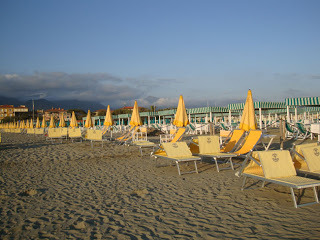
There’s a couple walking their dog along the edge of the sea - just pinpoints in the distance along miles of naked sand.
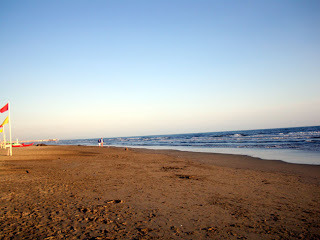 The waves are rolling in with un-mediterranean ferocity. We had a thunderstorm last night and some wild and windy weather, the remnants of cloud still clinging over the hills, and it’s washed up the odd tree trunk on the shore. But here are the tractors that clear the drift wood every evening to make it pristine for tomorrow’s bathers.
The waves are rolling in with un-mediterranean ferocity. We had a thunderstorm last night and some wild and windy weather, the remnants of cloud still clinging over the hills, and it’s washed up the odd tree trunk on the shore. But here are the tractors that clear the drift wood every evening to make it pristine for tomorrow’s bathers.
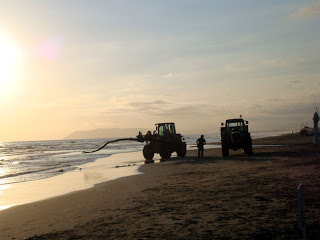
This is the time I love - an hour or so before sunset, warm-ish at 20 degrees with a cool breeze off the sea. I like the angles of light and the fact that there are no human sounds to interrupt the constant roar and hiss of the sea.
Neil is doing boy-things in the sand, trying out some ideas for a sand sculpture.
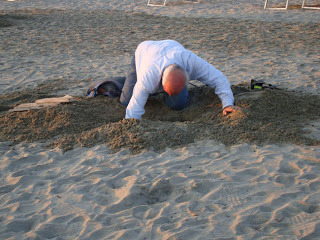 Neil digging to AustraliaEvery summer there’s a performance art festival on the beach and the artists here make sophisticated sandcastles. Neil, perversely, is digging. He’s not sure yet whether he’s going to take part, but I think it would be fun.
Neil digging to AustraliaEvery summer there’s a performance art festival on the beach and the artists here make sophisticated sandcastles. Neil, perversely, is digging. He’s not sure yet whether he’s going to take part, but I think it would be fun.
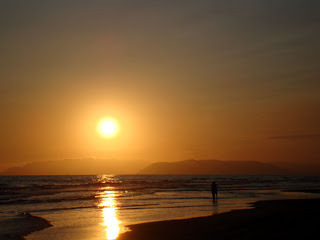
Now the dog-walkers and the tractors are gone and it’s only the two of us and the sea. The sun is setting over the Cinque Terre. After all the frenetic travelling and the earthquakes of recent days, such peace as this is perfect bliss!

There’s a couple walking their dog along the edge of the sea - just pinpoints in the distance along miles of naked sand.
 The waves are rolling in with un-mediterranean ferocity. We had a thunderstorm last night and some wild and windy weather, the remnants of cloud still clinging over the hills, and it’s washed up the odd tree trunk on the shore. But here are the tractors that clear the drift wood every evening to make it pristine for tomorrow’s bathers.
The waves are rolling in with un-mediterranean ferocity. We had a thunderstorm last night and some wild and windy weather, the remnants of cloud still clinging over the hills, and it’s washed up the odd tree trunk on the shore. But here are the tractors that clear the drift wood every evening to make it pristine for tomorrow’s bathers.
This is the time I love - an hour or so before sunset, warm-ish at 20 degrees with a cool breeze off the sea. I like the angles of light and the fact that there are no human sounds to interrupt the constant roar and hiss of the sea.
Neil is doing boy-things in the sand, trying out some ideas for a sand sculpture.
 Neil digging to AustraliaEvery summer there’s a performance art festival on the beach and the artists here make sophisticated sandcastles. Neil, perversely, is digging. He’s not sure yet whether he’s going to take part, but I think it would be fun.
Neil digging to AustraliaEvery summer there’s a performance art festival on the beach and the artists here make sophisticated sandcastles. Neil, perversely, is digging. He’s not sure yet whether he’s going to take part, but I think it would be fun.
Now the dog-walkers and the tractors are gone and it’s only the two of us and the sea. The sun is setting over the Cinque Terre. After all the frenetic travelling and the earthquakes of recent days, such peace as this is perfect bliss!
Published on June 26, 2013 13:00



